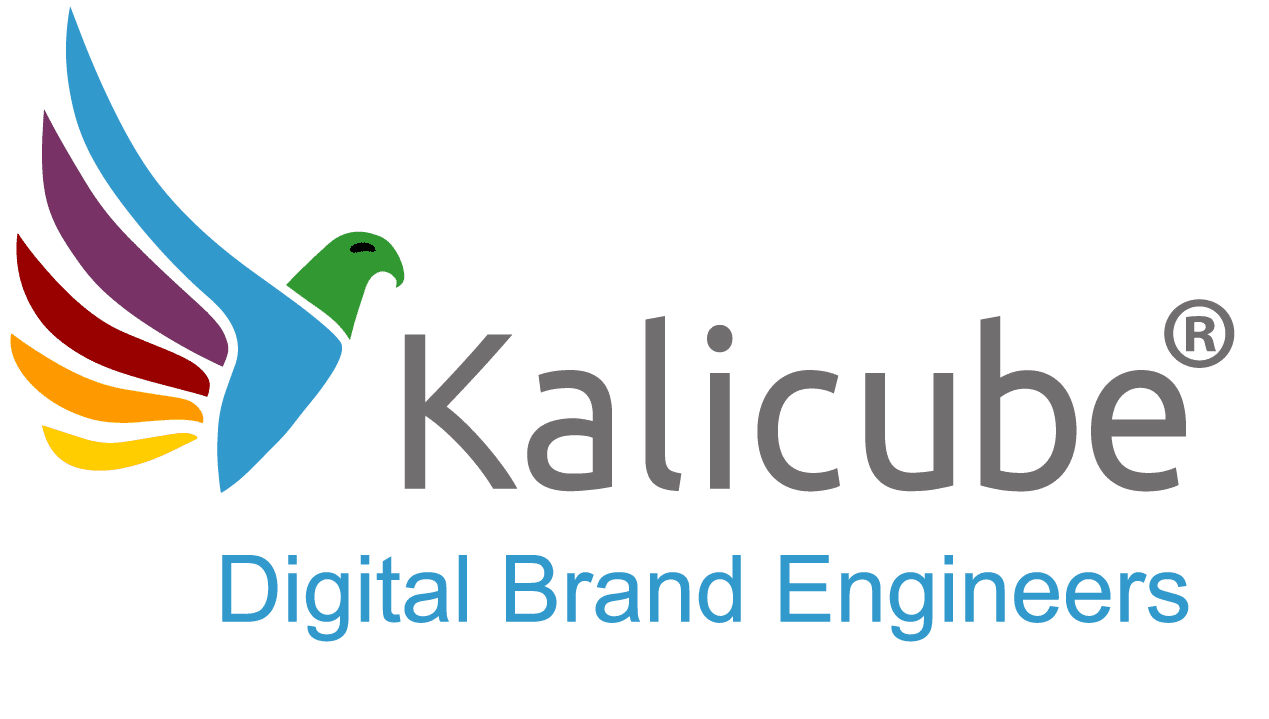Personal Branding: A Guide from Kalicube
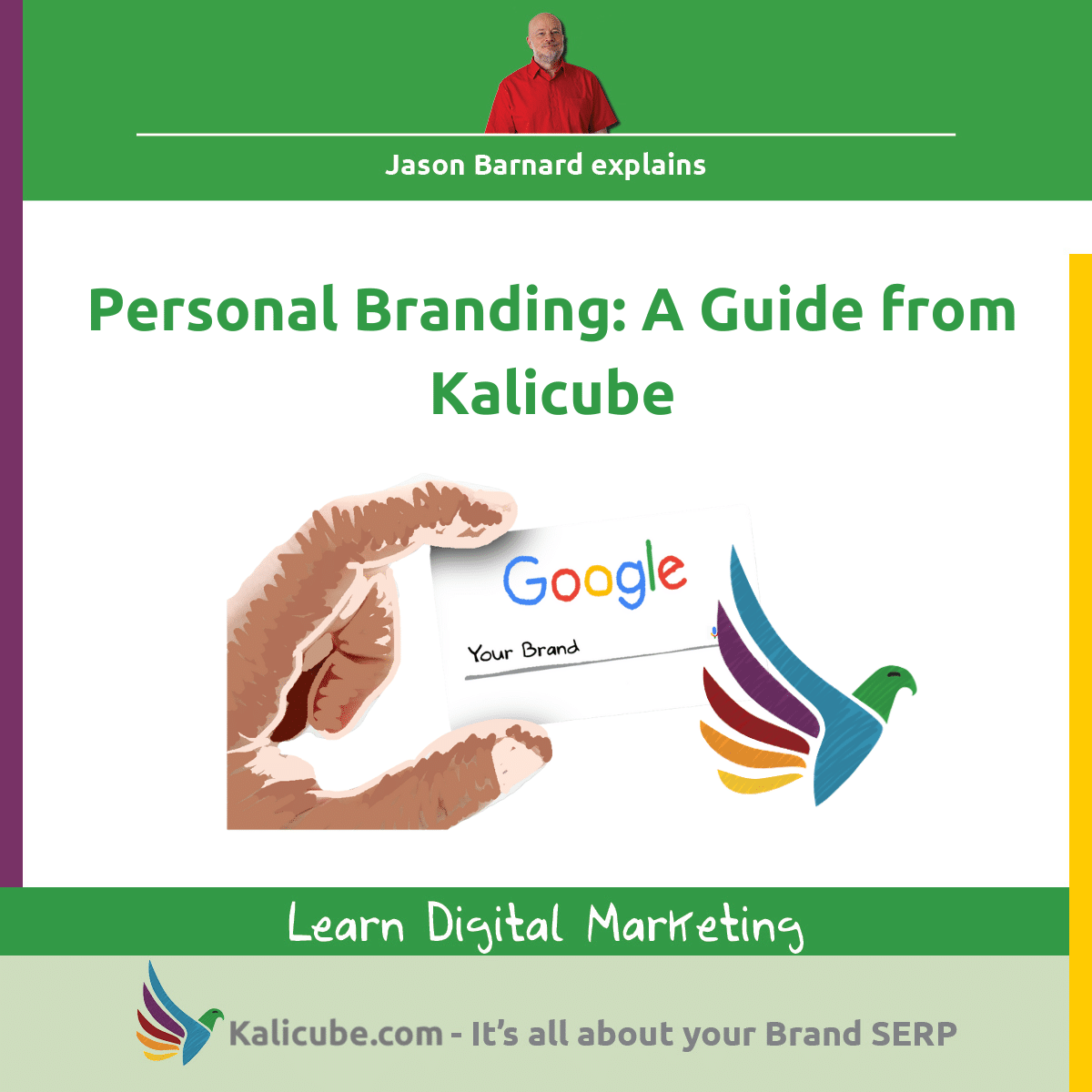
What is Personal Branding?
Personal branding is how a person markets and presents themself in the world, particularly in professional circles and across digital platforms.
Your personal brand defines who you are, what you do and who you do it for. Promoting what you stand for, your skills, experience, and personality. Your brand is your reputation, how you’re perceived, how you introduce yourself, and, most importantly, how others perceive you.
How does Kalicube Define ‘Personal Branding’?
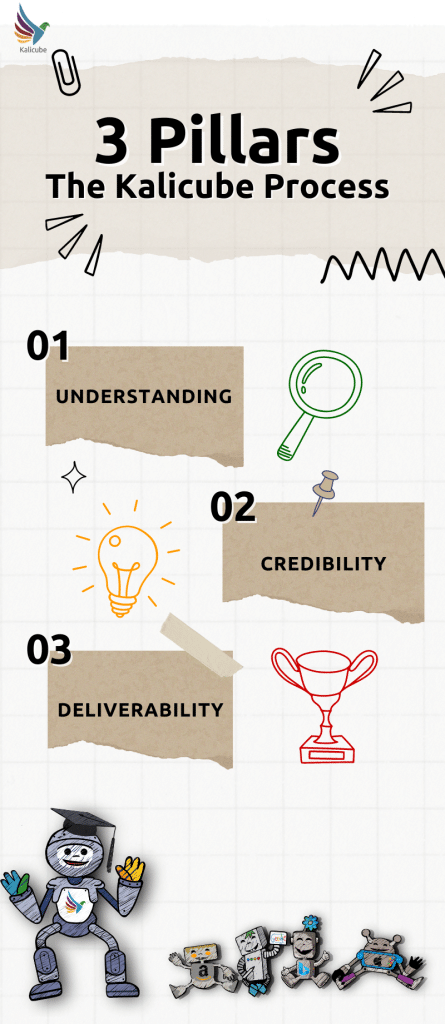
Kalicube defines ‘personal branding’ as the representation of a person’s integrity and true spirit online. It is about being authentic and staying true to who you are.
The idea behind this is that the true essence of your brand always comes out. Therefore, individuals are encouraged to be comfortable with themselves and show that to the world.
Kalicube specialises in managing online reputation by educating search engines to display your personal brand how you want it displayed. We build a virtuous cycle of understanding, credibility and deliverability so the search engines understand who you are and are confident to show your information as you intend.
When a user searches for your personal brand online, they are often in the final phase of a buying cycle and want to confirm you are who you say you are.
The Kalicube Process™ ensures the search results reinforce the messages you send to your audience.
Why is ‘Personal Branding Essential in Today’s Digital Age?
Personal branding is essential for several reasons:
Visibility and Recognition:
Personal branding helps you stand out from the crowd. It allows you to position yourself uniquely and helps people recognize you for your skills, knowledge, or perspective.
Trust and Credibility:
People tend to trust individuals more than corporations. By showcasing your authentic self through your personal brand, you can build credibility and establish trust with your audience.
Career Opportunities:
A strong personal brand can open career opportunities. It can help you land jobs, speak at industry events, build a business, or become a thought leader in your field.
Control over your Narrative:
Personal branding allows you to frame your narrative how you want it to be perceived, rather than leaving it up to the search engines to define.
Remember, personal branding isn’t only for celebrities or public figures. Anyone who wants to improve their online reputation, grow their career, or build their business can benefit from developing a solid personal brand.
How can Personal Branding Affect My Online Reputation?
Personal branding plays a significant role in shaping your online reputation. An effective personal brand presents a consistent, authentic, and professional package about yourself across various platforms.
This online package is often the first impression someone will have of you in the digital environment. A robust personal brand can highlight your expertise and establish you as an authority in your field, helping to build trust and credibility with your audience.
An inconsistent personal brand can cause doubts about your professionalism and reliability. If your personal brand does not align with your actions or your online behaviour contradicts your brand values, it can harm your online reputation.
A deliberately built and carefully managed personal brand can significantly enhance your online reputation, promoting positive perceptions and encouraging beneficial professional relationships.
How Can You Build a Strong Personal Brand?
Building a personal brand involves a consistent and conscious effort over time. Here are the key steps to follow:
- Self-Reflection: Before you promote your brand, reflect on who you are. Assess your strengths, passions, and unique selling propositions that you want to build your brand around.
- Define Your Brand: Once you know what you want to build your brand around, define it. Define your core values, skills, expertise, and personality traits that make you stand out.
- Create Your Personal Brand Statement: This could be similar to a slogan that quickly gives people an idea of who you are and what you can offer.
- Develop a Strong Online Presence: This involves creating a personal website, actively participating on relevant social media platforms, and ensuring your digital footprint reflects your brand and presents a consistent message.
- Consistently Publish Quality Content: This reinforces your knowledge and expertise in your chosen field and can significantly influence your brand. You can start a blog, create videos, write guest posts or host a podcast to share high-quality and helpful content with your audience.
- Networking: Build connections with other professionals in your industry. This broadens your exposure but also opens opportunities for collaboration.
- Be Authentic: Always stay true to yourself. Authenticity is vital to building a personal brand.
- Keep Learning and Evolving: To stay relevant, continually learn and develop new skills. Your brand should evolve as you grow personally and professionally.
- Monitor Your Brand: Regularly review your online reputation by conducting a self-audit. Look at online feedback and make adjustments to ensure your personal brand continues to reflect who you are.
Remember, building a personal brand is about showcasing who you are as a professional and an individual. It’s about sharing your experiences, lessons, successes, and values in a way that resonates with others and adds value to the world.
What are Common Mistakes People Make When Trying to Establish a Personal Brand?
Here are the most common mistakes people make when brand building.
Undefined Goals: Be specific about your expertise, and don’t focus broadly. It dilutes your message. It’s crucial to define your brand and narrow your focus. Know your strengths and where you can deliver the most value.
Inconsistent Messaging: It’s crucial to be consistent across all platforms and communication about your brand. Inconsistencies can confuse your audience, and the Search Engine Algorithms and create a perception lacking credibility.
Lack of Authenticity: Your brand is an honest reflection of who you are and what you believe in. Attempting to fake a persona or misrepresenting yourself can harm your credibility.
Neglecting Online Presence: Your online presence is vital for a personal brand. Neglecting your online presence, or not having a presence at all, can harm your brand.
Poor Content: Publishing poor-quality content or not providing valuable insights can decrease your credibility and deter your audience.
Ignoring Personal Growth: Be “always on and curious”. Update your skills in your area of expertise and showcase your growth. Continuous learning is vital to remaining relevant.
Failing to Network: Many individuals miss the opportunity to grow their personal brand through networking. Building relationships within your industry can expand your reach and influence.
Not Monitoring the Brand: Ignoring feedback or not addressing negative perceptions can harm your personal brand. Regularly review how others perceive you and adjust your strategy as needed.
Pro Tip: Building a personal brand takes time and requires a clear strategy, consistent effort, and ongoing adjustments based on feedback and changes in your industry. The Kalicube Process removes the guesswork and time it takes to entrench your brand in the search results.
What Role Does Kalicube Play in Personal Branding?
Kalicube fast-tracks Personal Branding by influencing how your brand is perceived and presented on search engines, predominantly Google.
It gives you the exact steps to take to establish your brand. This includes establishing an Entity Home for the personal brand, optimising Brand Search Engine Results Pages (SERPs) and managing Google Knowledge Panels to align with your desired brand narrative. The services include establishing the brand’s authority, improving its online reputation, and entrenching the brand within Google’s algorithms and Knowledge Vault for lasting benefits.
The Kalicube Process educates search engines about your business or personal brand, ensuring it appears in the results with the brand narrative.
With its cloud-based SaaS platform, Kalicube Pro™, Kalicube offers digital marketers, business owners and other online marketers a suite of data and tools to track, measure and report on brands throughout the search landscape. Kalicube Pro tracks millions of data points and industries. It identifies competitors and will create a digital marketing strategy for a personal brand in minutes. This proactive approach allows individuals and businesses to take control of their digital identity and reputation, ultimately strengthening their personal brand.
Tips on Maintaining Consistency When It Comes to a Personal Brand?
Tips for maintaining consistency are listed below.
- Define Your Brand: Clearly define what your personal brand stands for, including your values, passions, strengths and unique selling points. Understand what sets you apart from others.
- Consistent Messaging: Your communications on all platforms (social media, blogs, articles, etc.) should be consistent with your personal brand. The tone of voice, the values you emphasise, and the topics you cover should consistently reflect your personal brand.
- Visual Consistency: Maintain consistency in your visual elements too, such as the colour scheme, logo, or profile picture across all platforms. This helps create a recognisable identity.
- Regularity: Be regular in your interactions and engagements. Updating content regularly and participating in discussions or comments will help keep your brand in people’s minds.
- Stay True to Your Brand: Authenticity is key to personal branding. Ensure your actions are consistent with what your personal brand stands for.
- Feedback and Adaptation: Regularly monitor audience perception. Listen to feedback. Be willing to evolve, but make sure while remaining true to your core brand.
- Trigger and optimize Google Knowledge Panels: Consistently managing and updating your Google Knowledge Panel is also important. This ensures that anyone searching for your brand on Google sees the most relevant and accurate snapshot of your personal brand.
Remember, consistency is not about sticking to the same thing without evolution, but it’s about growing and evolving while always staying true to your personal brand’s core beliefs and values.
How Do You Measure the Success of a Personal Branding Strategy?
Use qualitative and quantitative metrics to measure the success of your personal brand.
For instance, consider the online presence and reach, gauged through the number of followers on social media, the level of audience engagement such as likes and shares, and interactions through comments. More direct indications of successful personal branding include ranking first for your personal brand, controlling your Brand SERP narrative, positive shifts in public perception noted during social listening, or a rise in website or blog traffic.
Click Through Rates in Google Search Console for your brand name are an easy quantitative measure.
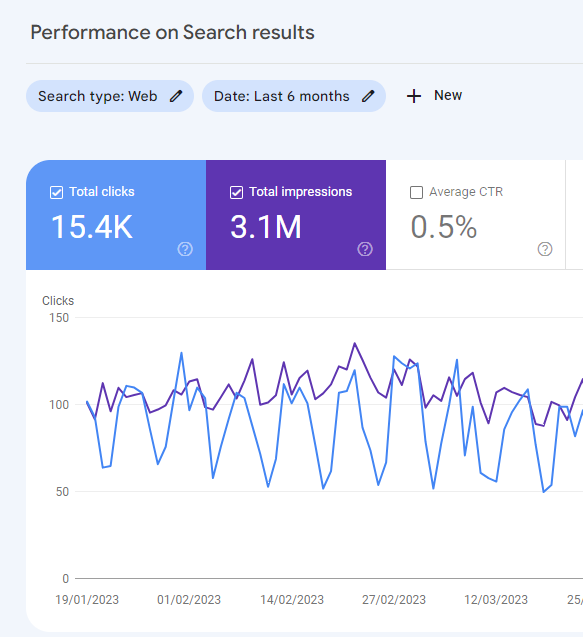
On a more practical level, concrete accomplishments such as invitations to high-profile events to speak or represent a field, career growth like promotions, new job offers or clients can also signify successful personal branding. Being asked to guest on a podcast or comment on a topic relevant to your brand is an important metric too. The continual review and adjustment of the strategy, based on these metric readings, is key to maintaining a successful personal brand.
How Does Personal Branding Influence Google’s Interpretation of a Brand or Individual?
Personal branding significantly influences Google’s interpretation of a brand or individual because it helps define and confirm the key elements Google’s algorithms use to index, understand, rank, and present content about a brand or individual.
When personal branding efforts are consistent and clear and exist in an Entity Home, Google’s algorithms have a precise source of information to draw from. As they crawl and index content, they detect patterns, topics, entities, relationships and repeated imagery. This information helps Google understand the brand or individual and reflects this understanding in search results.
If an individual has consistently positioned themselves as a digital marketing expert, Google’s algorithms will pick up this information from various sources like the individual’s LinkedIn profile, their blog posts, articles or publications they have written.
Google’s algorithms start understanding the brand and associate the individual’s name with digital marketing. in building the Knowledge Panel for the individual, reflecting the personal brand position.
Moreover, audience engagement, like shares, likes, comments, and backlinks, also guides Google’s interpretation and lends credibility to the personal brand’s claimed area of expertise.
When this information is corroborated by second and third-party sources, the algorithms grow more confident in their understanding of the brand.
What are Second and Third-Party Sources?
Second-party sources refer to the websites or platforms you partially control.
For example, your social media and YouTube accounts. You can control the information in your profile and your engagement on the platforms.
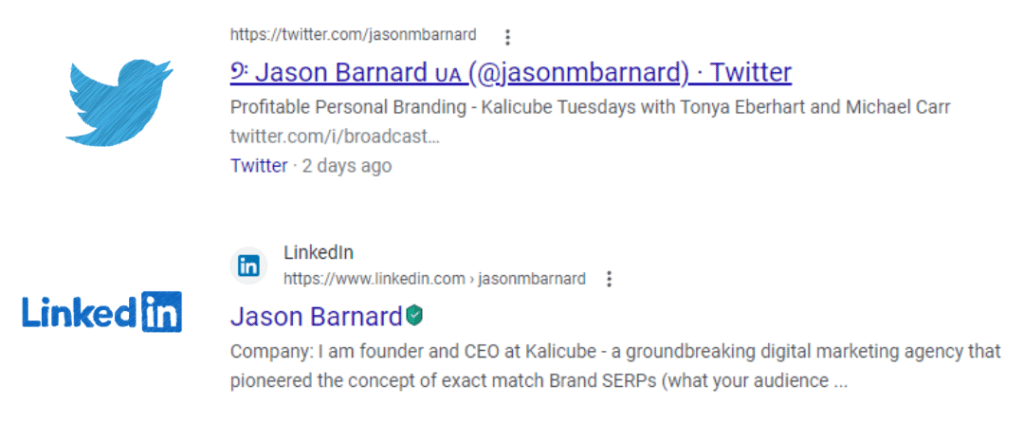
Third-party sources are websites or platforms you have no control over. These can be other sites where you’ve written guest posts or appeared as a guest on a podcast or a journalist mentioning your brand in a news article. They can play a crucial role in the process of optimising your online reputation and visibility, particularly in the context of SERPs (Search Engine Results Pages) and Knowledge Panel Management.
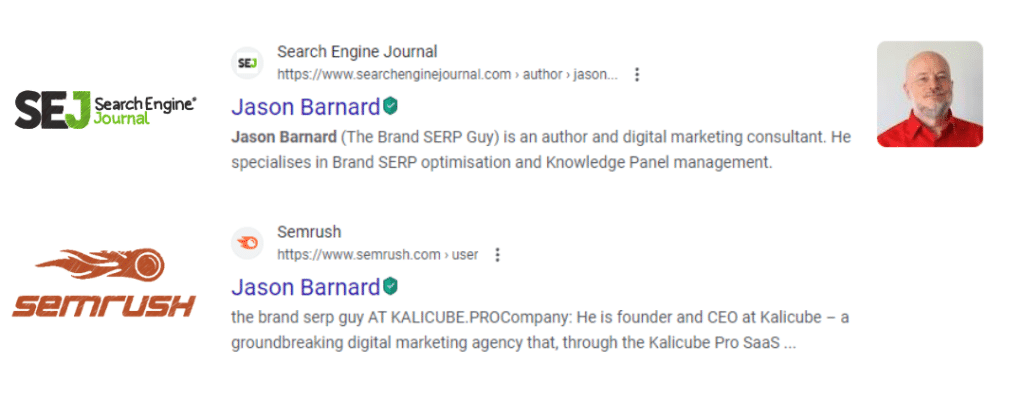
Regardless of the level of control, both second and third-party sources serve as important resources for providing information to Google and building up confidence in the accuracy of the information provided.
It’s essential to remember that Google’s interpretation is algorithmic, and information in the digital landscape is fragmented. Rigorously presenting a consistent message with corroboration from second and third-party sources is fundamental to educating search engines.
How Can Personal Branding Help in Driving Business Growth?
Personal branding plays a critical role in driving business growth. Here’s how:
- Building Trust and Credibility: People tend to do business with individuals or entities they find reliable and trustworthy, which can lead to an increase in sales, partnerships, or deals.
- Increase Visibility and Awareness: More people recognizing your brand leads to more business opportunities.
- Attract Ideal Clients or Customers: A well-defined personal brand helps you articulate your unique value proposition that sets you apart. This can attract the ideal clients or customers who value what you offer, driving business growth.
- Networking Opportunities: Networking opportunities generate potential partnerships, collaborations, or even referrals that positively impact business growth.
- Employee Attraction and Retention: People often want to work for leaders with personal brands they respect and admire. A good personal brand can attract talent and increase employee loyalty and satisfaction, improving service levels and business growth.
- Amplify Brand Messaging: Personal branding can amplify the messaging your business is trying to promote. People often feel more connected to other people versus a faceless corporation, thereby increasing the effectiveness of communication efforts.
Remember, establishing and maintaining a personal brand is an ongoing process and takes time, but the dividends it pays in business growth can be substantial.
What is the Relationship Between Personal Branding and Google’s Knowledge Panels?
Personal branding and Google’s Knowledge Panels are deeply intertwined. A Google Knowledge Panel is your digital business card. It gives the brand “Google’s Stamp of Approval.” It ensures a person’s or brand’s significant presence on Google’s Search Engine Results Pages (SERPs).
The information typically presented on a Knowledge Panel includes a person or a brand’s details like contact information, social media profiles, professional accomplishments, and other relevant data. This panel can serve as a brief introduction of a person or a brand to anyone who searches for them on Google.
Having an up-to-date and accurate Knowledge Panel is vital as it is perceived as a seal of approval from Google, highlighting the individual’s or brand’s online credibility and reputation. It’s an important part of the visible personal or brand’s messaging, as the panel often pulls up information about the individual or brand from all across the internet. Any inconsistencies or inaccuracies can affect their online image.
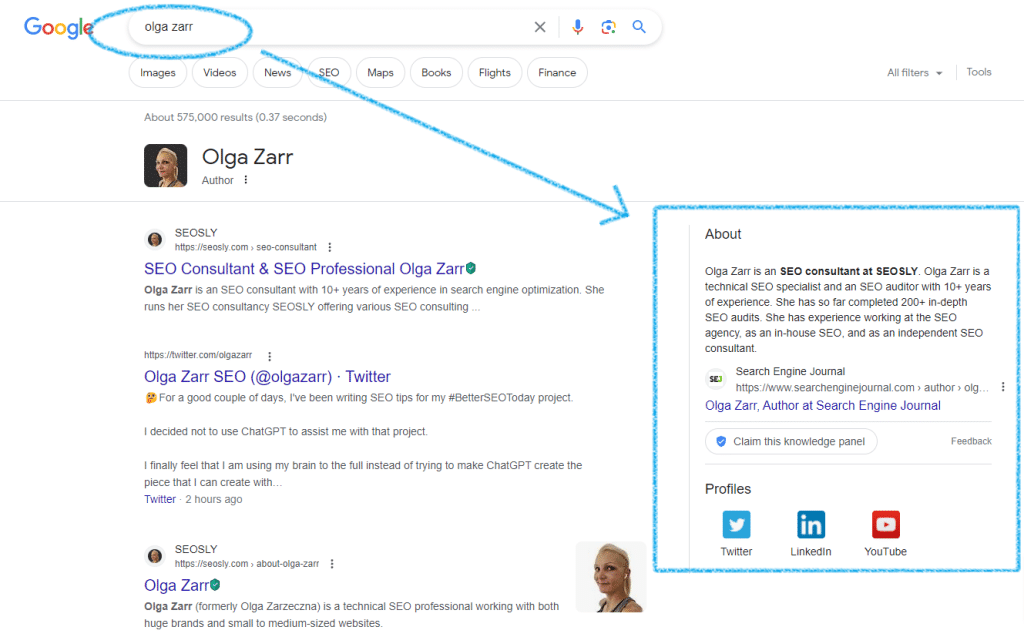
Thus, through effective management of these panels, individuals and brands can control or strongly influence the information Google displays about them. This essentially allows them to shape their personal branding according to their preferences and ensure it aligns with their professional image.
Conclusion
Maintaining and sustaining a Personal Brand in the dynamic digital landscape can be challenging, but Kalicube is here to simplify and accelerate the process for you. With our proven strategies and innovative tools, we work passionately to improve your Personal Brand and make it resilient to future changes.
Whether it’s Knowledge Panel Management or Brand SERP Optimization, our holistic approach aims to improve your understandability, credibility and deliverability online. This ensures visibility.
Through our services, you gain control of your online presence, influence how search engines perceive you, and effectively establish yourself as an authority in the industry.
With the evolution of AI and the digital ecosystem, now is the time to secure your online brand and stay ahead of the competition. Partner with us at Kalicube and take the first step to future-proof your Personal Brand. We look forward to guiding you on your path to online success.
Take the leap with Kalicube’s cutting-edge solutions! Your future-proof brand journey starts here!
If you’re interested in learning more about building your personal brand, download our Knowledge Panel Checklist or get started on the Kalicube® Process
Contributors:

Jean Marie
Website Content Manager. Joined Kalicube in February 2022
LinkedIn: www.linkedin.com/in/jeanmarielaurente
Email: [email protected]
